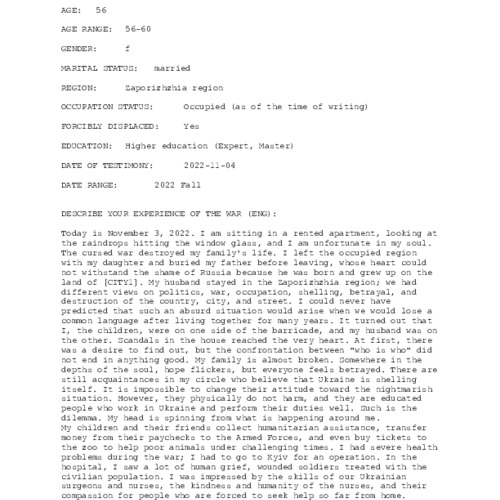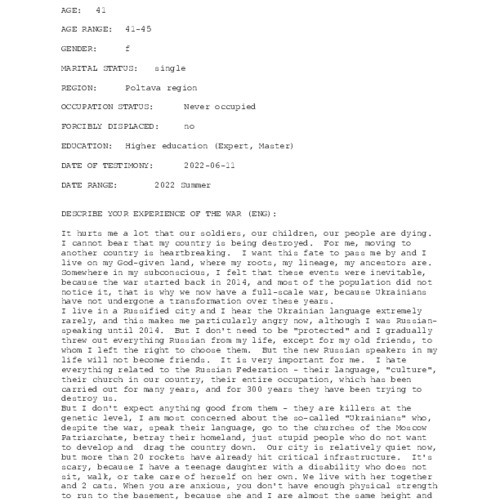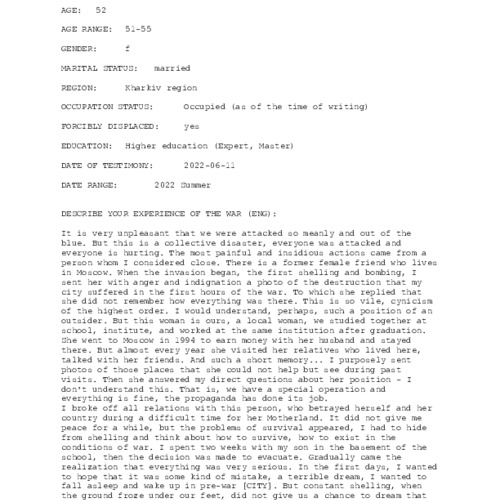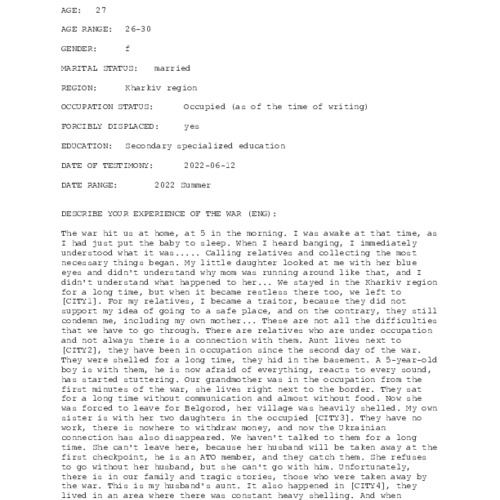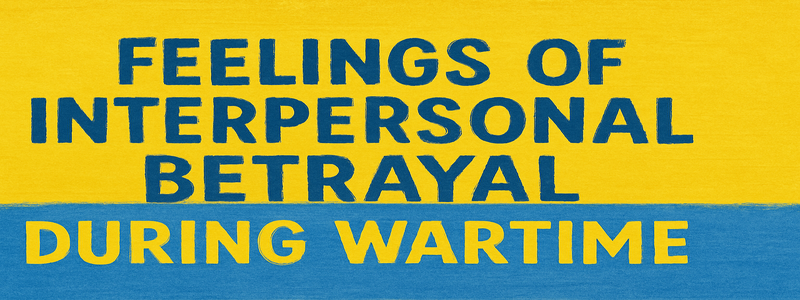
About the Exhibit
This exhibit explores the emotional toll of interpersonal betrayal during wartime through four testimonies from the Narratives of War virtual exhibit. While many testimonies in the Omeka archive express a sense of political betrayal -- particularly toward Russia, and at times, the Ukrainian government -- the selected testimonies (1433, 289, 323, and 61) explore more intimate feelings of betrayal at the interpersonal level.
These testimonies showcase how a feeling of betrayal can be prompted in a myriad ways -- the use of language, the impact of distance, the efficacy of propaganda, and different interpretations of history. These testimonies include a wife who felt her marriage fractured due to deep ideological differences, a friendship torn apart by distance and ambivalence, siblings estranged due to passivity, and a woman who feels betrayed by her entire community who chooses to continue to embrace Russian language and culture.
Each of these testimonies can offer an insight into how relationships can change and fracture in times of crisis. War can magnify aspects of identity that before may have been concealed or seen as irrelevant to the relationship (Skvarko, 2024). This can include aspects such as language, history, and beliefs which can in turn lead to diverging interpretations of where one's loyalties lay.
These testimonies also reveal how emotional estrangement is shaped by more than ideology. Distance, disinformation, inertia, and vacillation all contribute to a sense of abandonment. Betrayal, in this sense, is not always loud or violent. Sometimes, it is the quiet inability to empathize with someone in their moment of need. There becomes not just physical displacement, but also a broader emotional displacement.
Together, these testimonies explore war’s impact on the interpersonal aspects of life. Specifically, how betrayal during times of war can be more than just explicit illicit traitorous actions. Trust, belonging, and the fabric of everyday connection can unravel not only under bombs, but under silence, disagreement, and distance.
These testimonies showcase how a feeling of betrayal can be prompted in a myriad ways -- the use of language, the impact of distance, the efficacy of propaganda, and different interpretations of history. These testimonies include a wife who felt her marriage fractured due to deep ideological differences, a friendship torn apart by distance and ambivalence, siblings estranged due to passivity, and a woman who feels betrayed by her entire community who chooses to continue to embrace Russian language and culture.
Each of these testimonies can offer an insight into how relationships can change and fracture in times of crisis. War can magnify aspects of identity that before may have been concealed or seen as irrelevant to the relationship (Skvarko, 2024). This can include aspects such as language, history, and beliefs which can in turn lead to diverging interpretations of where one's loyalties lay.
These testimonies also reveal how emotional estrangement is shaped by more than ideology. Distance, disinformation, inertia, and vacillation all contribute to a sense of abandonment. Betrayal, in this sense, is not always loud or violent. Sometimes, it is the quiet inability to empathize with someone in their moment of need. There becomes not just physical displacement, but also a broader emotional displacement.
Together, these testimonies explore war’s impact on the interpersonal aspects of life. Specifically, how betrayal during times of war can be more than just explicit illicit traitorous actions. Trust, belonging, and the fabric of everyday connection can unravel not only under bombs, but under silence, disagreement, and distance.
